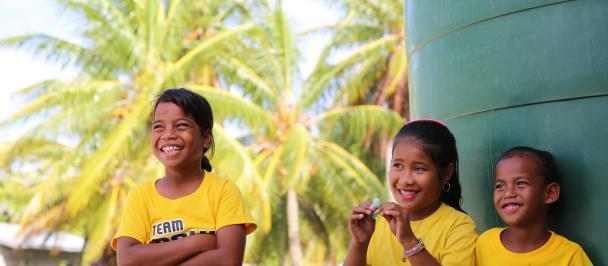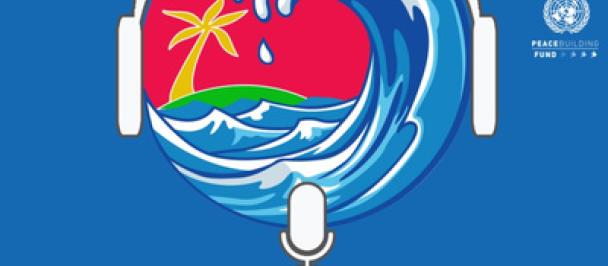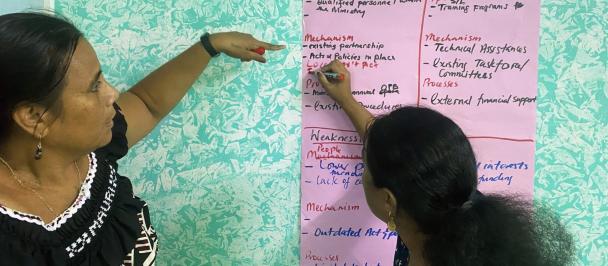Tuvalu Coastal Adaptation Project Scholarship Update
Equipping Tuvaluans with the expertise to advance climate adaptation
December 6, 2022
Funafuti, Tuvalu – Under Tuvalu’s National Strategy for Sustainable Development 2021-2030, “Te Kete” resilience to climate change and disasters are a key priority in the vision for a peaceful, resilient and prosperous nation. All citizens have a role to play – as Minister for Finance Hon. Seve Paeniu notes, “Together we have the capability to fulfil our potential and achieve the Tuvalu we want.”
Key to enabling all citizens and civil servants to contribute is education and capacity-building. Indeed, as Tuvalu’s policy on Training and Scholarships highlights, “The development of Tuvalu’s most valuable natural asset, the people who constitute its human resources…is of vital importance for the future development of the nation…Tertiary education not only improves Tuvalu's economic and social development by increasing the skill capacity of its workforce but that promotes self-reliance among its people by reducing dependence on foreign technical assistance.”
TCAP’s scholarships
One of the Tuvalu Coastal Adaptation Project (TCAP)’s three components is the strengthening of institutions, human resources, and awareness and knowledge for resilient coastal management. A key activity is long term national capacity-building – that is, equipping Tuvaluans with the technical expertise to advance adaptation into the future.
To this end, the project allocated funding towards a series of scholarships for students studying subjects related to coastal adaptation.
As of November 2022, five students are currently completing or about to commence their courses. In September 2022, Lisepa Paeniu went to Sydney’s University of New South Wales to pursue a Masters of Environmental Law. Charles Leepo is completing his Masters of Civil Engineering Degree via the Engineering Institute of Technology in Adelaide, while Feagaiga Penivao and Lamese Saamu will commence their Masters studies at Edith Cowan University in Perth and James Cook University respectively. Mr. Panama Niuatui, 36, from Vaitupu, will commence a Bachelor of Civil Engineering at the University of Southern Queensland in Australia in January next year.
In addition, a further five scholarships are being considered to be allocated to students already studying at the University of the South Pacific in Suva, Fiji (supported under the Ministry of Education’s scholarship programme). A Letter of Agreement between the Ministry of Education and UNDP is forthcoming.
Currently scholarship recipients will return to their current jobs. But once a planned National Coastal Authority Unit is set up, they will be absorbed into this unit.
This month, three TCAP scholarship recipients share their experience – what they have enjoyed, what they have learned, and their career aspirations when they finish studying.
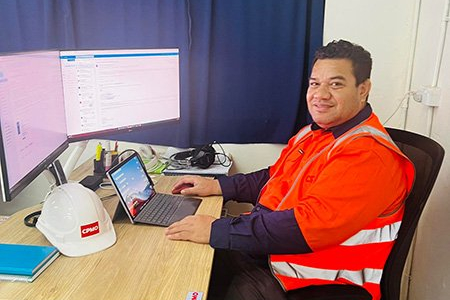
Mr. Feagaiga Penivao, 44, from Funafuti – currently a National Environment Safeguard Specialist for the Funafuti Water & Sanitation Project at Tuvalu’s Ministry of Finance – will shortly leave for Australia to complete a Masters of Science in Environmental Management at James Cook University.
What have you enjoyed about the experience of studying so far?
Learning various issues of Environmental Law in a comparative study between Tuvalu and Australia and the differences in approaches to derive sustainable solutions.
What interesting or surprising things have you learned about your chosen field of study and how do they apply to Tuvalu and/or Pacific Island countries more generally?
Firstly, Australia has water shortage problems that far surpass those of Tuvalu but it is with the environmental engineering that they manage to resolve this – which is where Tuvalu is lagging behind.
Secondly, sustainable technology used to solve environmental problems is only as good as the human resource capacity we have to maintain and fix the equipment.
And thirdly, legislative reforms to address environmental problems should consider traditional environmental knowledge in order for resource management and conservation to be sustainable and Tuvalu has a lot to offer for the Pacific and world especially with regards to marine protected areas such as the different seasonal ban of certain fishing methods of extraction of certain species of fish.
What are your career aspirations when you complete your degree?
I hope to be able to provide sound legal advice to our Government for the benefit of our people and eventually the Pacific region to address environmental issues in a sustainable manner.
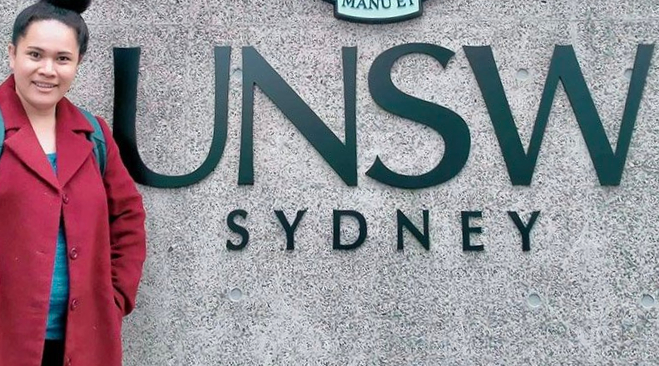
Lisepa Paeniu 31, from Nukulaelae is completing a Masters of Environmental Law at the University of New South Wales, Australia. After completing her studies online in 2021, Lisepa is now studying on campus in Sydney.
What have you enjoyed about the experience of studying so far?
Learning various issues of Environmental Law in a comparative study between Tuvalu and Australia and the differences in approaches to derive sustainable solutions.
What interesting or surprising things have you learned about your chosen field of study and how do they apply to Tuvalu and/or Pacific Island countries more generally?
Firstly, Australia has water shortage problems that far surpass those of Tuvalu but it is with the environmental engineering that they manage to resolve this – which is where Tuvalu is lagging behind.
Secondly, sustainable technology used to solve environmental problems is only as good as the human resource capacity we have to maintain and fix the equipment.
And thirdly, legislative reforms to address environmental problems should consider traditional environmental knowledge in order for resource management and conservation to be sustainable and Tuvalu has a lot to offer for the Pacific and world especially with regards to marine protected areas such as the different seasonal ban of certain fishing methods of extraction of certain species of fish.
What are your career aspirations when you complete your degree?
I hope to be able to provide sound legal advice to our Government for the benefit of our people and eventually the Pacific region to address environmental issues in a sustainable manner.
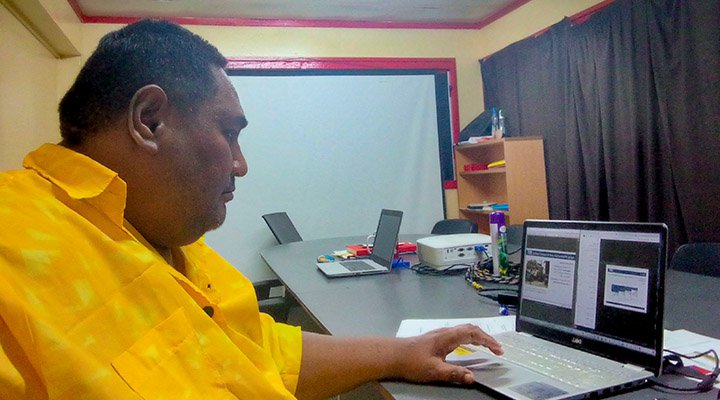
Charles Leepo, 45, from Nui – currently an architect in the Design and Supervision Unit of the Public Works Department at Tuvalu’s Ministry of Public Utilities and Infrastructure – is completing a Masters of Civil Engineering (Coastal) at the Engineering Institute of Technology in Adelaide, Australia.
What have you enjoyed about the experience of studying so far?
So far I’ve enjoyed being introduced to new structural analysis software, learning about risk management in construction, and sharing ideas and experience with engineering students from Africa, Australia and Asia.
What interesting or surprising things have you learned about your chosen field of study and how do they apply to Tuvalu and/or Pacific Island countries more generally?
Learning geotech structural analysis for designing substructures suitable for ground bearing condition.
Also learning advanced concrete with specific types of cement, aggregates, and other chemicals with the purpose of strengthening the concrete and increasing protection from salts and other chemical attacks.
Learning management system of forming large scale protect including the selection of suitable stakeholders and other objectives in order for the project success.
What I have learned helps prepare me to work as an engineer within the Tuvalu construction industries.
What are your career aspirations when you complete your degree?
I want to be an infrastructure consultant on national projects and be involved in coastal protection (for example, the design of seawalls, monitoring and maintenance).
---
For more information, please contact:
Imran Khan, TCAP International Project Coordinator, UNDP Pacific Office; Email: imran.khan@undp.org, WhatsApp: +679 837 6960

 Locations
Locations
